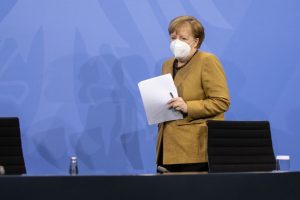Merkel Convenes Crisis Meeting With Vaccine Rollout Under Fire

Chancellor Angela Merkel called an emergency meeting to speed up Germany’s Covid-19 vaccine program in an effort to quell tensions within her government over claims the rollout has been too slow.
A day after the German leader tightened and extended lockdown measures, Merkel will gather top cabinet ministers on Wednesday to discuss how to accelerate production and distribution of shots.
The meeting was called after senior members of her Social Democrat partners, including Finance Minister Olaf Scholz, questioned her strategy of ceding responsibility for procuring vaccines to the European Union. With a national election slated for September, the tension threatens to inject party politics into the country’s pandemic fight.
At an ill-tempered meeting on Tuesday, Merkel and state leaders agreed to controversial limits on movement, sharpened restrictions on private gatherings and prolonged hard lockdown measures until at least Jan. 31. She also defended her vaccination strategy, saying more supply is coming soon.
“In the second quarter, based on all that we know from the manufacturers, we will already have significantly more vaccine doses,” Merkel said Tuesday in Berlin. The EU has ordered “significantly more vaccine than is necessary” to inoculate everyone in the bloc.
Underscoring the pressure facing Merkel’s government, Germany on Wednesday registered more than 1,000 Covid-related deaths for only the second time since the pandemic began. Contagion rates remain more than double a government target despite weeks of strict curbs.
Scholz, the SPD’s chancellor candidate who will attend the meeting, denied that his criticism was a campaign ploy.
“This is about a very serious issue, whether we can properly protect the citizens of this country,” Scholz said in an interview with ARD television on Wednesday. “The most important thing, not just for today but in the future, is that we do everything to make sure as much vaccine as possible is made in Germany and Europe.”
After a relatively mild outbreak in the spring, infections in Germany have doubled since the end of November to more than 1.8 million and deaths have surged above 36,000.
With hospitals filling up and concerns about a spike from the holidays still coming, authorities are worried about the pace of inoculations. Still, Germany is ahead of most other European countries.
According to the latest data from the RKI public health institute, about 317,000 people had been immunized in Germany through midday Tuesday, just under 0.4% of the population. That compares with around 1.5% in the U.S. and nearly 2% in Britain, which both began vaccinating several weeks earlier, and about 0.3% in Italy.
German Health Minister Jens Spahn, who will also be at Wednesday’s meeting with Merkel, has said he is hopeful everyone who wants a shot in Germany can get one by the summer. He cautioned though that it will take months for the vaccine program to have a tangible impact on the disease.
Scholz said Germany, which is supporting businesses affected by the lockdown, has the financial resources to weather the crisis “for a long time.”
Thanks to years of prudent budget policy, Germany’s debt as a percentage of gross domestic product won’t rise much above 70% and will quickly shrink again once the pandemic has receded, he told ARD.
| Read our QuickTake explainers: |
|---|
| How Do People Catch Covid-19? Here’s What Experts Say: QuickTake |
| Why the U.K.’s Mutated Coronavirus Is Fanning Worries: QuickTake |
| What To Know About Allergic Reactions to the Vaccine: QuickTake |
— With assistance by Chris Reiter
Source: Read Full Article
